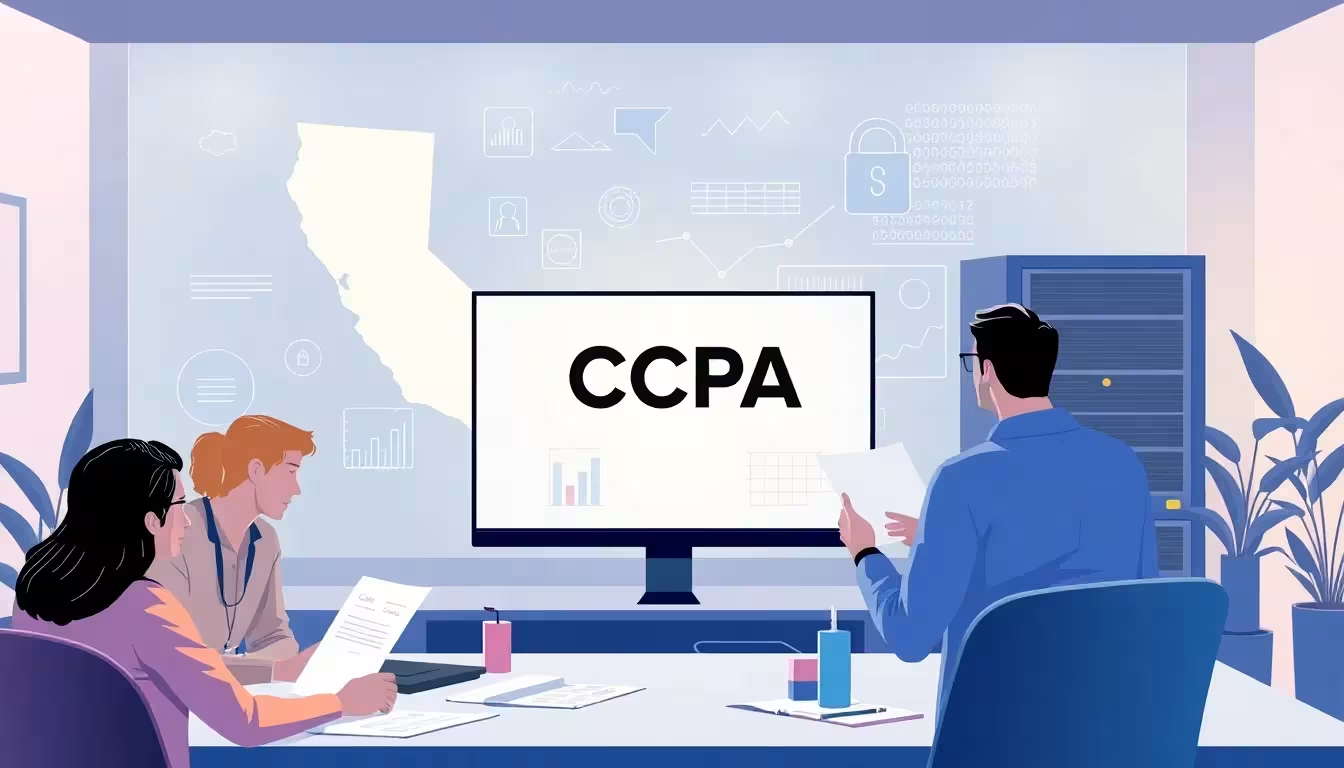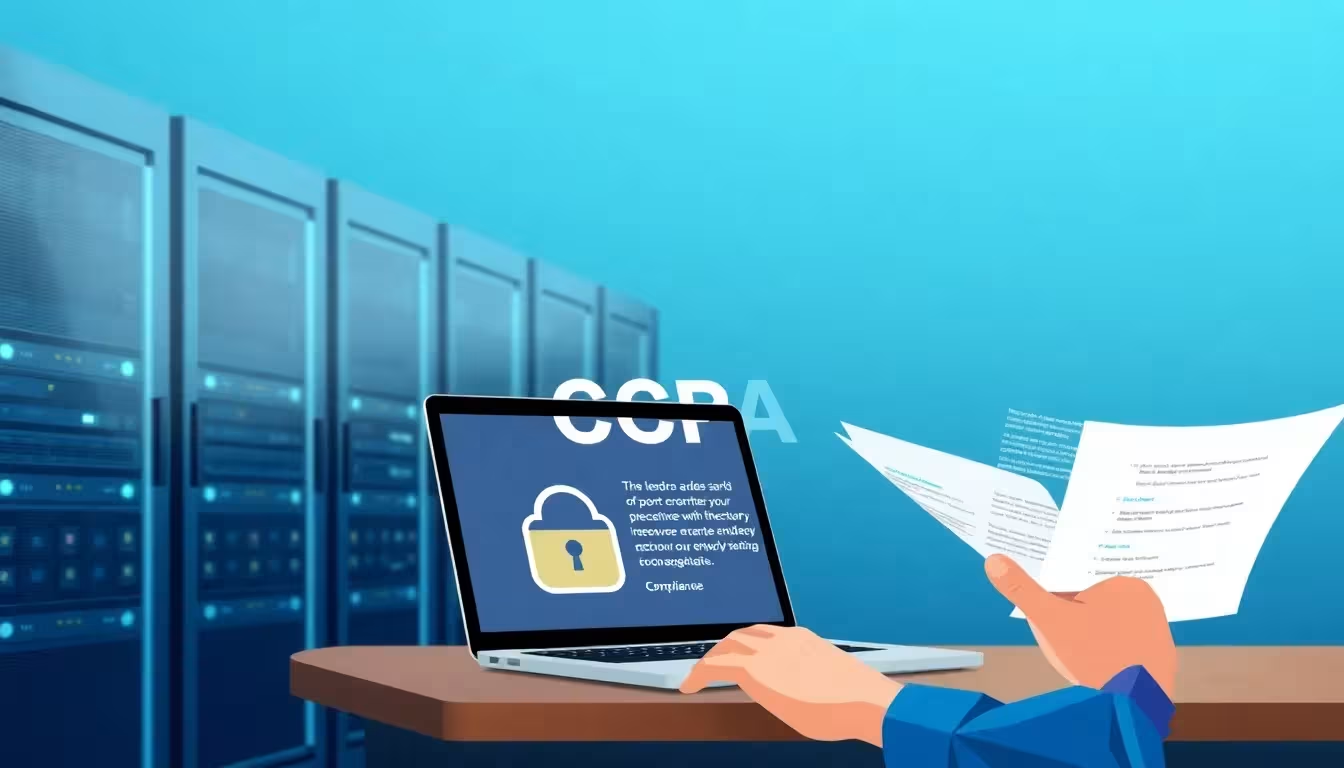CCPA hosting affects companies that process California-related customer data and requires specific data protection measures. Decision makers should be aware of important requirements around legal responsibility, data security and transparent user rights before choosing a hosting provider.
Key points
- Data protection obligationsHosting providers must strictly implement CCPA regulations.
- Consumer rightsOpt-out function and data access for users are mandatory.
- Security architecture: Providers should integrate security concepts according to current standards.
- Verifiable complianceDocumented processes and auditability are crucial.
- Technological implementationConsent management systems and monitoring tools are indispensable.

What does CCPA Hosting actually mean?
CCPA Hosting is aimed at hosting service providers that store or process the personal data of Californian users. These providers must take technical and organizational measures that cover all requirements of the California Consumer Privacy Act. These include opt-out mechanisms, encrypted data transmission and transparent communication about data collection. Anyone who manages customer data is automatically subject to this obligation - including e-commerce providers or service providers with online customer access, for example.
Hosting must ensure that personal information is not unintentionally exposed or used without authorization. Without appropriate CCPA compliance, you risk significant fines and reputational damage.
Important criteria for your hosting provider
A hosting provider only fulfills the CCPA requirements if it acts compliantly on several levels. This includes both technical security functions and organizational processes. Hosting service providers should at least meet the following criteria:
- Opt-out for data sales directly on the website
- Encrypted processing of personal data
- Contractually clearly regulated data usage rights
- Transparent communication about data storage
- Regular audits and internal data protection officers

Secure data processing: What does hosting need to be able to do?
CCPA-compliant hosting protects personal data with various security measures. These include firewalls, automatic security audits, end-to-end encryption and access restrictions. Particularly important: providers must adhere to the highest standards not only when storing, but also when processing and forwarding data. Your stored information is permanently sensitive, regardless of whether it is actively used or at rest.
It therefore makes sense to think about a Hosting with integrated data protection management that implements both GDPR and CCPA requirements in daily practice.
CCPA hosting vs. traditional hosting - a comparison
The following table shows the most important differences between conventional and CCPA-compliant hosting solutions:
| Feature | Standard hosting | CCPA Hosting |
|---|---|---|
| Data encryption | Optional | Required |
| Transparency obligation | Partial | Comprehensive |
| User rights (opt-out) | Mostly not available | Prescribed |
| Legal conformity | By area only | CCPA-compliant |
| Data usage control | Limited | Clearly regulated by contract |

Opt-out management as a mandatory function
A central element for CCPA hosting is the option for users to actively object to the sale of their data. This must be covered by a so-called "Do Not Sell My Personal Information" function. Hosting providers must ensure that this function is visible, technically integrated and legally robust. Anyone who ignores this obligation is in direct violation of the CCPA - the consequence can be fines of up to 2,500 US dollars per data protection violation.
It is therefore best for hosting service providers to check in advance whether their system supports such functions natively or can be retrofitted. Tools such as consent management platforms help to create legal certainty.
Data transparency and auditability
Hosting solutions with CCPA compliance ensure that all processing of personal data is fully documented. Companies must be able to prove at any time where and for what purpose data is collected, stored or passed on. This means that without suitable technical logging, you can quickly violate the CCPA - and your hosting solution becomes a weak point.
Providers who offer clear insights into log data, change histories and user activities offer good support in this context. Information on required transparency for websites also help with the correct classification.

Data protection strategy and long-term planning
Anyone who is permanently reliant on legally compliant hosting should develop a long-term data protection strategy. This includes regular training, progress checks of the providers and comparison with changes to the law. Only those who actively work on complying with CCPA requirements can operate in a legally secure manner in the long term. This applies not only to hosting itself, but also to related processes such as customer support or newsletter distribution.
A change of provider is possible at any time, provided the new solution can take over existing data and already meets the requirements. If you act systematically, you will save yourself rework and contractual problems in the future.
Technologies that support implementation
Various technologies are used to ensure that a hosting service provider meets all CCPA requirements. These include control systems for user rights, encryption technologies, monitoring tools and audit logs. These systems not only need to be in place, they should also be able to be integrated into your existing systems. Providers that offer tools for consent management and data classification are particularly helpful.
Webhoster.de, for example, offers pre-configured CCPA-compliant packages with a consistent security architecture. You can find more tips in this article about Data protection compliance for web hosting.

Extended aspects of the compliance architecture
Many companies underestimate how complex the technical and contractual integration of CCPA requirements can be. In addition to the aforementioned mechanisms for encryption, opt-out management and auditability, the consistency of the entire system environment is a decisive factor. This means that all components - whether databases, file storage systems or content management systems - must implement clearly defined guidelines for the handling of personal data.
In practice, this often means that the main system receives requests for data deletions or opt-outs, for example, and all connected systems automatically adopt this status. If such synchronization is missing, it can happen that the data is deleted in a main system but still exists in a backup or a secondary service. A uniform compliance architecture therefore not only promotes data security, but also the smooth processing of data requests.
Global reach and CCPA
The CCPA primarily applies to California residents, but in the digital age, boundaries are often blurred. Global companies that sell or provide services online will most likely process California data as well. Even if a company is located in Europe or Asia, it may receive orders, subscriptions or other interactions from California. Providers and operators are therefore well advised to find out about the requirements at an early stage and design their hosting accordingly.
In some cases, it may make sense to separate the company into regional units in order to better control data flows and more clearly define the impact of the CCPA on individual business areas. However, this involves additional costs and organizational complexity. In any case, transparent web hosting and clear communication about data practices remain the key to operating in compliance with the law worldwide.

Internal training measures and awareness-raising
Even the best CCPA-compliant hosting is of little use if staff do not know how to use the functions provided. Regular training, workshops and onboarding processes for new employees are essential to keep CCPA topics present in everyday working life. Support staff, web developers and administrators in particular should be aware of the typical pitfalls when handling personal data.
The training includes the following points, among others:
- Recognition of personal data categories
- Understanding opt-out processes and their legal significance
- Secure handling of log files and audit data
- Contingency plans for data breaches
Companies that act consistently in this area reduce their risk of breaches and avoid expensive rectifications. In addition, they show customers and partners a professional attitude towards data protection, which can be a decisive factor, especially in the B2B sector.
Mechanisms for data collection and labeling
One of the key points in the CCPA is to know what data is being collected in the first place. This requires that the systems in place clearly record and label data. This includes:
- Automatic marking of which data records originate from California
- Information on whether data is collected for sale or only for internal purposes
- A structured schema that assigns clear processing purposes to each category of data
Modern hosting platforms and content management systems often already offer tools for data classification. If they are missing, implementation is significantly more complex - but essential in order to meet the requirements of the CCPA. This is because without recording the origin and type of data, opt-out mechanisms cannot take effect in a targeted manner.
Compliance with reporting obligations in the event of data breaches
Should a data breach occur despite all precautionary measures, both the CCPA and other data protection laws stipulate strict reporting obligations. Companies must inform the affected users within a certain time frame if unencrypted and sensitive data has been compromised. The exact manner in which this notification must be made is regulated in the CCPA. A hosting provider can provide important support here by:
- Rapid detection of irregularities (monitoring)
- Automated alerting and escalation processes in the event of a suspected data breach
- Support with the forensic investigation in the event of damage
Hosting with strong security and monitoring functions can make a decisive contribution to minimizing damage and meeting legal requirements within the prescribed deadlines.
Legal protection and contract design
For CCPA hosting to really take effect, watertight contracts are needed between the company and the hosting provider. Final detailed regulations should specify exactly in which cases the provider may or must act, how data is passed on to third parties and which security standards apply. Companies often rely on so-called "Data Processing Agreements" (DPAs), which regulate exactly how personal data is processed. A well-drafted DPA can both clarify operational obligations and regulate liability issues in the event of damage. It is therefore advisable to carefully check the standard contractual clauses when selecting a hosting provider.
In combination with the existing data protection concept, the right contract design avoids later conflicts and creates clarity about the areas of responsibility of all parties involved.
Challenges in cross-border data processing
In particular, companies that have customers from several US states or even worldwide are often faced with the challenge of different data protection standards. The CCPA is only one piece of this puzzle, while in other regions - such as the EU - the GDPR becomes relevant. This is where choosing a hosting provider that understands and supports multiple data protection regimes can help reduce complexity. Such providers offer documentation and best-practice approaches to cleanly separate data flows or manage them in a globally standardized way.
A purely Californian company may focus strongly on the CCPA, but in practice many companies grow beyond their original market. For this reason, international data protection requirements should already be considered when planning a website or online store to avoid having to migrate again in a short space of time.
Compliance culture as a competitive advantage
At a time when trust in digital services is becoming increasingly important, a visibly practiced data protection and compliance culture can become a real competitive advantage. Customers and business partners want to be able to rely on their data being handled securely and in compliance with the law. Anyone who consciously chooses a CCPA-compliant hosting provider and emphasizes this in their communication channels sends a clear signal: data protection is taken seriously here.
In the long term, the company benefits in several ways, as potential customers are more inclined to hand over their data if they know exactly that they can explicitly request information, deletion or opt-out at any time. This transparency also reduces the risk of complaints and legal disputes.
Thoughts at the end
CCPA hosting is not just an add-on, but a fundamental requirement for companies with Californian contacts. If you want to store personal data responsibly, you need hosting partners who are not only technically but also contractually committed to data protection. A clearly documented opt-out mechanism and verifiable security measures ensure legal certainty and at the same time strengthen user trust. This is particularly important in a growth-oriented digital environment, where data is the most valuable asset.



